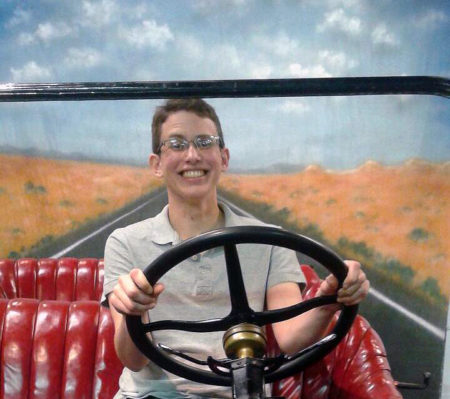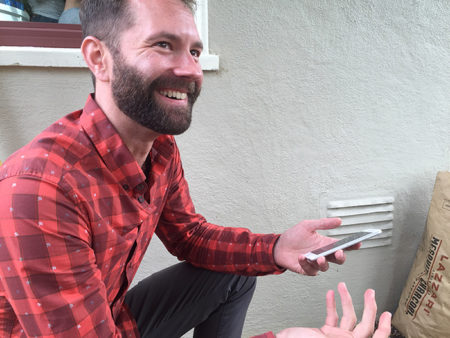Lesbian, Gay, Bisexual, and Transgender Pride Month is celebrated each year in the month of June to honor the 1969 Stonewall riots in Manhattan. The Stonewall riots were a tipping point for the Gay Liberation Movement in the United States. As part of Pride Month, we profile employees Deb Agarwal, Elijah Goodfriend, and Andrew Hagen.
Deb Agarwal, Senior Scientist and Data Science and Technology Department Head, Computational Research Division
![Deb Agarwal (right) and wife Diane. (Credit: Catalina Kulczar, from Let Love Reign [www.letlovereign.org], her personal photography project for marriage equality.)](https://diversity.lbl.gov/wp-content/uploads/sites/18/2016/06/Agarwal_LetLoveReign-450x300.jpg)
Deb Agarwal (right) and wife Diane. (Credit: Catalina Kulczar, from Let Love Reign [www.letlovereign.org], her personal photography project for marriage equality.)
When Deb Agarwal first joined Berkeley Lab 22 years ago, she loved seeing the rainbow flag fly every June. But a number of years back, she noticed that it hadn’t flown for a couple of years. No one seemed to think it was a big deal, but Agarwal felt otherwise, so she took it upon herself to make sure it was up every June.
“I can honestly say that I have never felt any bias at Berkeley Lab, and I’ve always been very open about my sexual orientation,” she says. “To me, the flag is a visible symbol of our strong culture of acceptance at the Lab. It tells people that we are intentionally inclusive of LGBT individuals in our workplace and not just ‘accidentally’ inclusive because we didn’t care.”
Agarwal, head of the Lab’s Data Science and Technology Department, believes in the importance of role models. She recalls that a member of her group when she first started at the Lab was openly gay, and very intentionally so, as she had been through the era of the Stonewall riots and fought hard for LGBT rights. “I only hope that I’m able to be as authentic as her, to help the community,” she says. “We need many examples of people who are out and succeeding in the workplace, just being themselves, to make it seem natural to everyone.”
Growing up in the Midwest, Agarwal experienced a culture of less acceptance. She recalls a close family friend from the Midwest saying, “Oh, I’m so sorry,” when she came out, assuming it meant a life of hardship. “I had to tell her, ‘oh no, you don’t understand … I live in California and this is not a problem,’” Agarwal says.
Lately, Agarwal has been thinking a lot about the broader LGBT spectrum. She helps host an LGBT forum at the annual Grace Hopper Celebration of Women in Computing Conference, and says hearing from transsexual and bisexual women about their experiences in the workplace has been eye-opening.
“There’s been a lot of focus on the legal rights for the ‘L’ and the ‘G,’ but we need to be dealing with the whole spectrum and enabling everyone to feel comfortable being who they are,” she says. “Right now it feels like in the early days of gay marriage, where we still have a long way to go with the rights of people with the broad range of gender and sexual orientations and treating everyone with respect and acceptance.”
The early days of gay marriage were memorable for Agarwal. She and her partner of 18 years waited in line for nine hours to get married in 2004, on Presidents’ Day weekend when Gavin Newsom and his staff decided to start issuing marriage licenses to same-sex couples on the grounds of equal protection in California. “It was one of the most positive experiences I’ve ever had,” Agarwal recalls. “People came by all day to support those of us waiting in line bringing us food, encouragement, and entertainment, including tap dancers, and just this overall sense of celebration.”
She continues: “When we called our parents during the ceremony, they were so happy for us and wanted to know if they could send us a gift, when was the reception, where we were going on a honeymoon. It was the first time they could understand my wife and I as a long term committed couple; whereas their reaction to domestic partnership was, ‘OK honey.’”
It was then that Agarwal realized the importance of gay marriage. “I honestly hadn’t thought of it as a big deal before that,” she says. “But gay marriage matters because it gives people a frame of reference for how to treat us as a couple at the doctor’s office, at the hospital, visiting family, etc.”
Agarwal and her wife had another marriage ceremony in 2008 when same-sex marriage became legal statewide. “We had rings and a reception that time around,” she says. “It was really fun.”
Elijah Goodfriend, Postdoctoral Fellow, Computational Research Division
 Just a month after he started as a postdoc in the Lab’s Computational Research Division, Elijah Goodfriend was reaching out to the Lab’s Diversity and Inclusion Office (DIO) for guidance.
Just a month after he started as a postdoc in the Lab’s Computational Research Division, Elijah Goodfriend was reaching out to the Lab’s Diversity and Inclusion Office (DIO) for guidance.
“I came out as transgender soon after starting here, and I was really struggling with the process of how to handle that at work,” he says. “(DIO’s) Lady Idos was able to connect me with two other Lab employees who’d gone through it, and it was so helpful.”
A year and a half later, Goodfriend is part of a committee that’s helping the Lab craft a set of guidelines for employees navigating transitions. “The other employees I spoke with who’d been through the process were very generous with their time, but obviously that can’t happen every time, so it’s great that the Lab is supportive in putting together these guidelines,” he says.
“Coming out at work was awkward, but it’s inherently awkward and no one can change that,” he says. “The Lab’s support helped me figure out all the bureaucratic stuff, which isn’t easy. All of my coworkers have been fantastic; they basically didn’t care, which is the best possible reaction.”
Goodfriend looks forward to seeing the Lab’s guidelines published very soon, partly because it would be a welcoming gesture to transgender employees. “I think it will make people feel better just to know that the Lab has thought about these things, even if they’re not all figured out yet,” he says.
While the question of which bathrooms transgender students should use is a hot-button national issue these days (“only because America has made it an issue”), he says it is nice to know that the Lab policy is that employees should use the bathroom that they feel comfortable using, according to their identified gender.
He adds: “But it would be nice to make that even clearer. And it would be so great if we could simply have each Lab building have a gender-neutral, single-stall bathroom, but there are of course issues of cost.”
Goodfriend grew up on the East Coast and still travels to New York City frequently but says he’s lived in Berkeley for long enough now that he sometimes forgets what it’s like to live in a less-accepting culture.
“I would say that the Bay Area definitely understands a lot more about the gender spectrum than the slightly more conservative New York City,” he says. “But sometimes it can actually can be more comfortable for me to be in the New York City environment because people just see me as a man; they categorize you and they’re done.”
Goodfriend sees the current “bathroom battle” as indicative of a larger movement toward greater acceptance of the LGBT spectrum as a whole. “I’m optimistic that we are going to get over this fight relatively quickly because I feel like, as a culture, we’ve been building momentum toward acceptance,” he says. “I think the struggles for gay, lesbian, bisexual, women’s, and trans rights are all linked to this idea of what your gender should determine about you.”
He concludes: “When our culture comes closer to the answer—which is that gender should determine nothing about you—all of those struggles become easier. As that momentum gains, I think we’ll be OK.”
Andrew Hagen, Postdoctoral Fellow, Molecular Biophysics and Integrated Bioimaging Division
 Andrew Hagen has had times in his life where he has had to “pass” as straight, but on the whole he considers himself extremely fortunate to have grown up and lived in a community and family that’s been accepting and supportive of him. Coming to Berkeley Lab has been a similarly positive experience for him.
Andrew Hagen has had times in his life where he has had to “pass” as straight, but on the whole he considers himself extremely fortunate to have grown up and lived in a community and family that’s been accepting and supportive of him. Coming to Berkeley Lab has been a similarly positive experience for him.
“My Ph.D. advisor, Jay Keasling, was openly gay, which really reassured me that it was a safe space,” says Hagen, who started as a grad student working at the Joint BioEnergy Institute (JBEI). “There was really no question in my mind that I would go to an institution that was supportive and had those values.”
Within his first few months at JBEI, Hagen noticed emails from the Diversity and Inclusion Office and announcements of LGBT meetings and events on campus, all of which reinforced for him the inclusivity at the Lab. Hagen is now a postdoc in Cheryl Kerfeld’s group.
“Frankly, that’s kind of what I’m used to after growing up in a very liberal area with a very understanding family,” says Hagen, who grew up in Fairfax in Marin County.
He had family members who were out, and his dad’s best friend is gay, but he still found it difficult to come out to his dad as a teenager. “I was going to a friend’s prom with him and that’s when I finally sat down and told my dad I was gay,” he recalls. “He was sort of like, ‘OK, that’s great, have fun at prom.’”
“I feel very privileged to have a family that’s so accepting,” Hagen adds.
Even though his family was supportive, they still had concerns for their son. Hagen’s parents lived in San Francisco in the 1980s and saw the worst of the AIDS epidemic. “So they are understandably scared of me contracting HIV,” he says. “I’m not sure they’ve come around to the understanding that if someone’s getting properly treated, it’s a pretty manageable disease and the risk of transmission is quite low.”
Hagen says he feels like the Pride parade in San Francisco has changed a lot over the years, as legal rights have been won and acceptance for the LGBT community has grown. “It’s sort of morphed into a big party these days,” he says. “I tend to go to parties at friends’ houses where we can celebrate the essence of the parade, but in a little bit calmer atmosphere.”
One area where Hagen still sees legal and equality challenges is adoption. He has close friends who have tried to adopt for many years, to no avail, given the bias against gay couples both in the United States and other countries. “The sad thing is that they’d have much less trouble adopting as single men,” Hagen says. “And they’d make such great dads.”
-Keri Troutman

Thank you for sharing this message of inclusion! One of the great reasons to be Staff at UC.